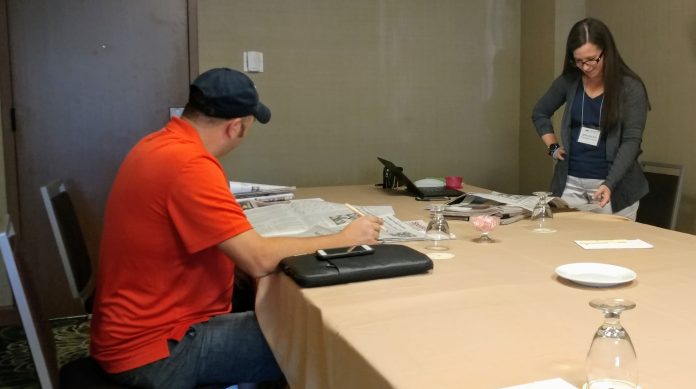By Erik Hall
APSE Diversity Fellow Jenni Carlson grew up in Clay Center, Kansas, and is now a columnist at the Oklahoman. She is a proud 1997 graduate of University of Kansas.
What made you interested in a career in sports journalism?
I grew up in a small town in Kansas of about 4,000 people. And much like many small towns, sports were the thing to do. It was the social gathering. It was the, you know, town hall meeting without the town hall meeting, sort of what everybody did. And so it just very much became a part of my life, and I dabbled a little bit in sports — golf was my big thing — I just realized that I wasn’t gonna have a future long-term career in it. And I wanted to be involved in sports and started doing journalism when I was in high school and really just fell in love with the team aspect of journalism, to be honest with you.
Why did you want to be a diversity fellow?
I just think that old fabled toolbox that you have to have is, it needs to be bigger and more robust than ever, you know — whether you’re a columnist or an editor or a beat writer, or whatever. And I felt like this was a good opportunity to expand some skills that I had, but also to learn some new stuff.
What are some things that you took away from the diversity fellowship weekend in Nashville?
I was really focused on a lot of the internet-based information that we got, which was, frankly, a lot of what we talked about. … It was maybe smaller things that I took away that I felt like I could do right away, just in terms of, you know, how to use Google Trends to have a better web headline that might increase your traffic. It might have nothing to do about, you know, the content having been good or bad before, but it might be that you just didn’t have a very searchable headline, or you didn’t, you know, pair up what you’re tweeting out with visual images, video, or photo or something like that. I think those are seemingly small things, but they can be really significant in how much traffic you can draw. And obviously, everybody’s aware of trying to continue to grow audience and numbers. And so that was significant.
What would you say is your greatest professional achievement?
There aren’t too many women that are sports columnists in the country. You know, that’s one of those areas that I think is continuing to be an area where you don’t maybe see as many women, so the fact that I am one and, you know, have been around to see other women get that chance. That’s been really nice.
Who are your favorite writers?
Gary Smith probably jumps to mind first of all. … It almost makes me feel like he’s doing something that the rest of us can’t possibly do.
Anything else you want to add?
I’ve been so happy to be involved with the fellowship.





